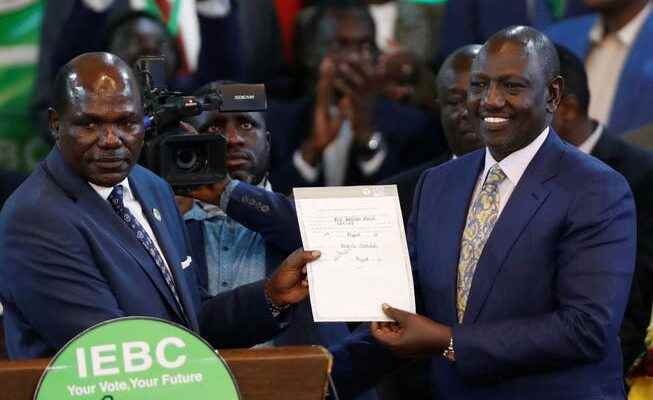The Vice President of the East African country succeeds Uhuru Kenyatta. The announcement of the election results was marked by inconsistencies.
Kenya’s new President, William Ruto (right), has been the country’s Vice-President.
The East African country of Kenya has a new president: William Ruto won last week’s elections, the electoral authorities announced on Monday in Langata, a suburb of the capital Nairobi. This makes Ruto, who previously served as the country’s vice president, the fifth president of Kenya since the republic was proclaimed in 1964 and Great Britain gained independence a year earlier.
The result of the election was extremely close: Ruto won the race with 50.49 percent of the votes. In view of the poll results before the election, this result is surprising. It was thought that Ruto’s main rival, 77-year-old longtime opposition leader and former Prime Minister Raila Odinga, would win the race by six to eight percentage points over Ruto. However, these forecasts and surveys did not come true. Odinga received only 48.9 percent of the votes.
For Raila Odinga, who likes to portray himself as the father of the nation, the current elections were the fifth attempt in the race for the country’s presidential office. Accordingly, Odinga’s campaign team appeared to accept the result only with reluctance. After the announcement of the results by the electoral authority had been announced for 2 p.m. (Swiss time), it had to be postponed several times because Odinga could only arrive late for the announcement, his spokesman announced.
Supposedly “opaque” counting
Shortly thereafter, four of the seven commissioners of the Independent Electoral and Boundaries Commission declared that they could not support the election result. According to the deputy chair of the commission, Juliana Cherera, she and three other members “cannot recognize the results of the presidential elections” because the counting of the votes, which they had previously monitored themselves, was “opaque” in the last few meters. Cherera did not explain what exactly she meant by that and what indications of possible electoral fraud should be available.
Despite these inconsistencies, the president of the electoral commission, Wafula Chebukati, announced the final results in the Bomas of Kenya conference center shortly after 5 p.m. Swiss time in front of supporters, waiting journalists and the rest of the country in front of the television sets and officially declared William Ruto as the elected president. In a short speech, Ruto addressed the population of all political camps and called for peace, quiet and order. Nobody would benefit from violence and riots. It is now a matter of working together for the country.
Repeated unrest in recent years
Unlike previous years, Kenya’s elections this year have been largely peaceful, calm and, as far as can be judged, largely fair. There is said to have been some evidence of attempts to influence or falsify the election results, but only to a very limited extent. Peaceful and fair elections are important for Kenyan democracy and the people. Because in the past, parliamentary and presidential candidates have regularly caused chaos and unrest.
For example, during the last presidential elections in August 2017. These ended in chaos: Inconsistencies were already being reported during the elections. The Kenyan Supreme Court then declared that serious irregularities had been found and had the elections repeated. The repeat was won by incumbent Uhuru Kenyatta, who was elected president of the country for the second time, beating his main rival at the time, Raila Odinga. And in the years before that, there had been repeated riots. After the 2007 election, more than 1,500 people are said to have been killed and up to 600,000 displaced.
Due to the slow counting in these elections, the confusing and at times completely stopped counting process and the close result, the fear of unrest was aroused again this year.
It is now up to the new President William Ruto, who likes to present himself as a representative of the working class, which often suffers from poverty, to unite the country behind him.
